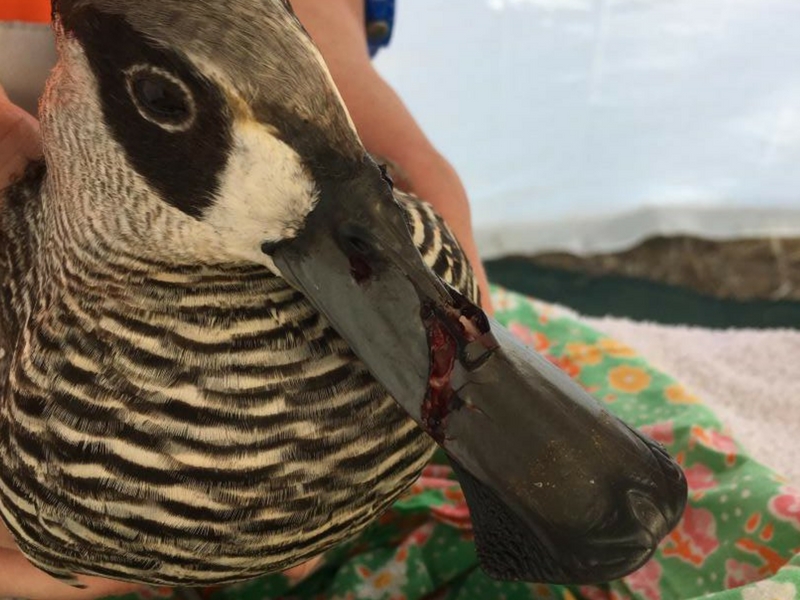
Falling duck numbers, unavoidable wounding and serious bird flu risk.
RSPCA South Australia is extremely concerned by the State Government's decision to allow another duck hunting season at a time when targeted birds migrating from the northern hemisphere threaten to bring with them the highly infectious H5N1 strain of bird flu. Australia is currently the only continent free of the H5N1 strain, which has the potential to decimate wild bird populations and the poultry industry.
Acknowledging that it is inevitable the virus will arrive in Australia, the federal government recently announced it was "investing an additional $95 million to further prepare and protect the nation against a strain of avian influenza that carries significant risks for our agricultural industries, our unique wildlife and the national economy".1 (There has only been one reported human case of H5N1 in Australia so far but there have been hundreds overseas, with many proving fatal)
In the past two years, this strain has killed millions of wild birds and tens of thousands of wild mammals around the world, including seals and sea lions in Antarctica. Recently in the US, the virus spread rapidly to dairy cows, poultry and domestic cats.
The Australian Veterinary Emergency Plan's strategy for managing potential H5N1 outbreaks states that:
"…activities such as hunting, poisoning of wild bird populations, spraying toxic products or habitat destruction should not be considered as HPAI disease control measures. These activities are likely to accelerate their dispersal and potentially further spread the infection."
Similarly, key conservation and animal welfare groups recommend preventing hunters from disturbing wetlands. This is to strengthen wildlife resilience, prevent potential virus transmission and allow government agencies to properly manage bird flu risk.4 RSPCA SA Animal Welfare Advocate Dr Rebekah Eyers described the announcement of a 2025 duck hunting season in South Australia as irresponsible. "When the expert advice is to avoid activities like hunting because it stresses wildlife, disperses potentially infected birds and exposes humans to the virus, it makes no sense to take this risk just to appease a tiny minority of people who like shooting at flying birds," Dr Eyers said.
Duck hunting is banned due to welfare concerns in NSW, Queensland and Western Australia. But despite the South Australian government's consultation finding strong community demand to ban duck hunting here, the government has announced a season will begin in SA on Saturday 22 March and finish on Sunday 29 June. Hunters will be permitted to shoot five species and to take a maximum of six ducks per day (including a maximum of two Australian shelduck/mountain duck).
RSPCA has long opposed duck hunting because the shotgun pellets that recreational hunters fire at flying ducks tend to wound them rather than kill them outright. After retrieving wounded ducks, hunters frequently fail to kill them quickly and humanely. The Australian Veterinary Association also opposes duck hunting due to its inherent welfare issues.
This year there are significant conservation concerns in addition to welfare concerns, compounded by the H5N1 bird flu threat. The 2024 University of NSW Eastern Australian Waterbird Survey found a drop in bird numbers, with the populations of most of the species targeted in long term decline.
"These waterbirds are under extreme pressure, with the latest annual survey reporting their numbers had almost halved since the 2023 count due to dry, unfavourable breeding conditions and shrinking habitat," Dr Eyers said.
"So it's astonishing that instead of protecting our waterbirds who are struggling with drought and the risk of contracting the deadliest bird flu yet, we will put them under even more stress and increase the risk of spreading this awful virus by allowing hunters into wetlands.
"We must remove unnecessary stressors to our wild birds and contain this virus when it arrives, by keeping hunters out of the wetland habitats of these birds.
"Reports alleging serious shooter non-compliance and bird suffering have been lodged after every hunting season in SA for the past three years. It is already impossible to regulate duck hunting, so trying to manage H5N1 risk on top of that will lead to even more wildlife suffering and potential disease risk."






